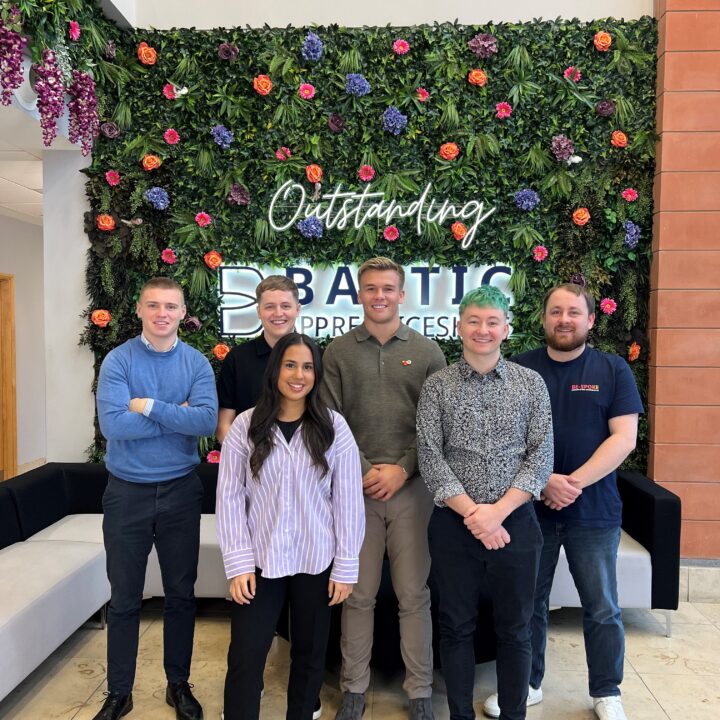At Baltic Apprenticeships, data serves as a critical foundation for driving strategic decisions, improving learner outcomes, and promoting business growth.
Our dedicated Data Team plays a central role in analysing trends, enhancing retention and achievement rates, and providing actionable insights to ensure continuous improvement across all areas of our apprenticeship programmes. The team has successfully transformed data practices, implemented innovative systems, and navigated challenges to enhance overall performance.
Team Description & Role
Baltic’s Data Team is made up of a diverse range of roles with different specialisms, following a clear structure and led by a Senior BI Manager; including three Data Analysts, a Junior Data Engineer, and a Business Improvement Project Manager.

Together, they handle various data types, including sales and learner data, using tools such as Azure, Tableau, Python, and SQL to process and analyse this information. The team has implemented several impactful systems, such as an automated reporting system for sales data and a learner retention analysis process. The team’s primary mission is to ensure data-driven decision-making within the company, improving operational efficiency while focusing on learner outcomes and business growth.
The team collaborates closely with other departments, especially sales, to ensure data insights lead to tangible improvements in business practices. The cross-functional nature of the team allows them to bridge gaps between data, sales, and operations, providing a comprehensive view of performance and areas needing attention.
Improved Innovation: Sales Performance & Learner Retention
The Data Team has made transformative changes in how data is utilised at Baltic Apprenticeships. A major innovation was the shift from manual, Excel-based sales reporting to a fully automated, data-driven approach leveraging in-house systems and advanced dashboards. This transition has saved considerable time and improved the accuracy and reliability of reports, allowing for a focus on data analysis rather than data preparation.
One of the most notable innovations is the P1 scoring system, which provides an objective way to measure the productivity of sales teams. Previously, sales performance was assessed subjectively, often based on individual perceptions. Now, with the P1 system, a transparent, data-backed approach gives the sales team clear performance indicators, helping guide training and development.
Additionally, the development of the Targeted Guidance System (TGS) has been pivotal in improving learner retention. TGS uses a range of data inputs to predict which learners are at risk of dropping out of their apprenticeship programmes. It enables early interventions, whether through additional support from coaches or more focused engagement with employers. This system has improved retention and helped allocate resources more effectively, ensuring issues are addressed before they escalate.
Team Collaboration
The Data Team greatly impacted the adjustments Baltic made to entry requirements for several programmes, introduced to improve outcomes for both apprentices and employers.
A pattern was identified in learner retention data, showing that particular cohorts had higher dropout rates. To address this, insights from recruitment, retention, and sales data were combined and the Data Analysts provided statistical evidence of which groups were struggling, while the Business Improvement Manager worked on adjusting the entry criteria to better align with learners who had historically performed well.
The Team Leader and Junior Data Engineer built reports tracking learner performance across different stages of their apprenticeships. By blending this information, the team presented a solid case to the recruitment team to adjust entry requirements, leading to better-aligned recruitment processes. This collaboration not only reduced dropout rates but also ensured more targeted recruitment efforts, reducing the costs associated with learner turnover.
Overcoming Obstacles to Improve Business Practices
Through detailed analysis, the Data Team identified declining retention rates for learners placed with employers that offer lower-than-average salaries or lack a strong HR infrastructure. Historically, these learners felt unsupported and left their programmes early.
To counter this, the Data Team recommended a series of pre-emptive measures to be introduced. The Data Team recommended that the wider team increase the frequency of learner check-ins, particularly during the first few months of placements, when learners are most vulnerable, and the Business Improvement Manager worked directly with employers to help them better understand the unique needs of apprentices, providing training on effective support. In some cases, support materials were created for employers, offering guidance on implementing basic HR practices to help apprentices feel secure and valued in their roles.
Another key obstacle was the lack of real-time data insights, which the team tackled by improving data infrastructure. Moving from a reactive to a proactive approach, the Data Team were able to predict potential issues and intervene early, significantly reducing the risk of learner dropouts and improving retention.
Outcome & Benefit to the Business
The combined impact of the Data Team’s efforts over the last 12 months has been substantial.
The automated sales reporting system has freed up significant time for both the Sales and Data Team, allowing them to focus on strategic activities rather than manual processes. The P1 scoring system has transformed how sales performance is measured, promoting a more objective, data-driven culture that has led to improved productivity across the board.
TGS has had a direct effect on learner retention, significantly reducing dropout rates. By identifying at-risk learners early and providing timely interventions, the team has helped more learners succeed in their programmes while maintaining strong relationships with employers.
Overall, the team’s data-driven approach has enhanced Baltic’s reputation for being responsive and innovative. The systems in place have improved internal efficiency and made a measurable difference in learner success and sales performance, contributing directly to Baltic’s revenue and long-term growth.